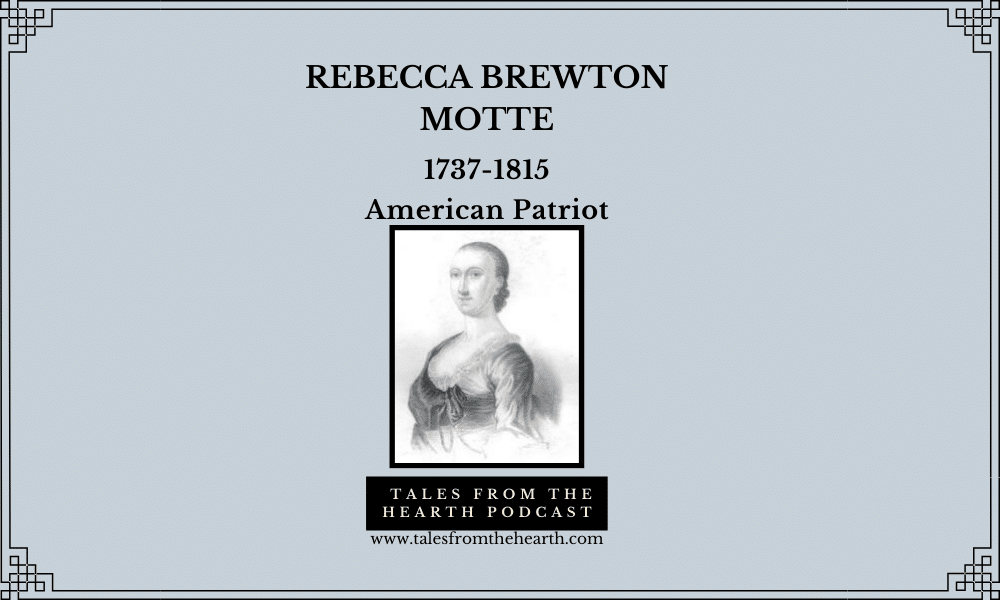Rebecca Brewton Motte
Have you ever thought, “Dealing with my house is so overwhelming, that maybe I should just burn it down”? Today’s featured lady did just that when she found her home filled with enemy soldiers. Join us for today’s episode on South Carolina Patriot Rebecca Brewton Motte.
Let’s get cracklin’, shall we?
**********
Rebecca Brewton Motte was a wealthy South Carolina patriot and landowner who found even greater success later in life as a widowed rice planter. Rebecca inherited both her brother’s and husband’s properties after their deaths during the Revolutionary War, and was immediately faced with difficult decisions about managing property and her family’s safety.
Rebecca Motte was most known for her extreme dedication to the American Revolutionary cause. On top of providing food and supplies to the Continental Army, she allowed them to burn down her house to secure a key victory over the British. She even provided the ammunition for the house to burn down even quicker!
**********
Sources for today’s story are: Many! As always, refer to the episode show notes at www.talesfromthehearth.com – that’s www.talesfromthehearth.com. You can find all of the links to the resources for today’s episode on our website.
You can view many photos and links to information about Rebecca Brewton Motte on our Pinterest board located at https://www.pinterest.com/TalesfromtheHearth/rebecca-brewton-motte/.
A primary resource is a great book about women entitled South Carolina Women: Their Lives and Times, Volume 1 by multiple editors and contributors.
The One Takeaway I hope you get from this story is: Asking for permission is sometimes better than asking for forgiveness.
Now, I hope you enjoy the story about Patriot Rebecca Brewton Motte.
***********
Rebecca Brewton was born on July 15, 1737, in Charles Town, South Carolina, the youngest of three children of goldsmith, militia officer, and politician Robert Brewton and his second wife, Mary Griffith. After the U.S. Revolutionary War, Charles Town changed its name to Charleston to distance itself from association with the British crown.
Rebecca grew up incredibly wealthy, and many of her properties, including her family home located at 71 Church Street in Charleston, SC, are still standing today.
Rebecca’s wealth multiplied through advantageous marriages of the three Brewton children. Rebecca’s older sister, Frances, married their first cousin, Colonel Charles Pinckney, and Frances’s and Charles’s son, Charles Pinckney, signed the U.S. Constitution and served as South Carolina Governor and U.S. Senator.
The eldest and only son, Miles, married Mary Izard, who also brought considerable property and wealth to the marriage. He was a wealthy merchant, shipowner, landowner, and unfortunately, made much of his money as a slave trader in Charleston. He and his entire family drowned at sea in 1775 when they were attempting to travel to Philadelphia from Charleston to escape British forces in the South. Rebecca and her sister, Frances, inherited much of Miles’s wealth.
Rebecca married Jacob Motte, Jr. at the age of 19 in 1758. Jacob Motte, Sr. was a South Carolina treasurer and businessman who also owned advantageous properties. The junior Jacob Motte became a politician, slave owner, and wealthy planter.
Rebecca and Jacob had seven children (of which three daughters lived to adulthood) and also raised Susanna Smith Elliott as their ward.
Their daughter Elizabeth Motte married Thomas Pinckney, whose mother, Eliza Lucas Pinckney, was a wealthy planter who cultivated indigo in South Carolina. Pinckney later became governor of South Carolina and the second U.S. diplomat to Great Britain. Elizabeth passed away in England in 1794.
Their second daughter, Frances Motte, married John Middleton. After John’s death and the death of her older sister, Elizabeth, Frances married Elizabeth’s widower, Thomas Pinckney. Confused yet? Thomas was Rebecca’s son-in-law—twice!
Their last daughter, Mary, married fellow Patriot Colonel William Alston and lavishly entertained President George Washington at her Clifton estate in South Carolina in 1791.
If you recognize all of those names—Pinckney, Middleton, and Alston—then you’re right—they’re all illustrious names in South Carolina and U.S. history. If you tour downtown Charleston, South Carolina, today, many of their homes (and the homes of their descendants) are major tourist attractions.
Both Jacob and Rebecca Motte were successful and wealthy patriots who supplied food and supplies to Continental forces during the Revolutionary War. Much of the reason for their wealth was unfortunately due to unpaid slave labor. Rebecca’s husband, Jacob, died early in 1780, a few months before British forces took control of Charleston (Charles Town). The British commandeered many of her properties, including the gorgeous home of her late brother, Miles Brewton, which is still standing today. The British command forced Rebecca and her family to stay in the home and serve as gracious hostesses. Rebecca wisely kept her wealthy and eligible teenage daughters mostly out of sight.
The eldest daughter, Elizabeth, married Patriot Major Thomas Pinckney and became pregnant with their first child in the Brewton home while the British were still occupying it, so Rebecca obtained permission to move her and the rest of the family to their Mount Joseph plantation near current-day St. Matthews, South Carolina. Quickly after, the British identified Mount Joseph as an ideal river location. They followed Rebecca to Mount Joseph, moved in, reinforced it, and renamed it “Fort Motte.” Once again, the British forced Rebecca and her family to play the kind hosts to enemy forces.
In late 1780 Elizabeth’s husband, Major Thomas Pinckney, was gravely wounded in battle and would have certainly lost his leg had the British not tended to his wounds. British command gave him permission to recuperate at Fort Motte with his wife and son. Rebecca served as quite the nurse to Pinckney, but also to daughter Elizabeth and her grandson Thomas, who had both come down with smallpox. All three recuperated and temporarily relocated to Philadelphia, where Thomas continued to serve the American cause.
In May 1781 Patriot forces commanded by Brigadier General Francis “Swamp Fox” Marion attempted to recapture Fort Motte. They were easily able to blockade the British forces within the fort and victory seemed certain. British forces within the fort would not surrender, however, preferring to wait it out, as reinforcement troops were on the way.
The American forces needed a quick surrender before reinforcements arrived. They hatched a plan to set fire to Fort Motte to smoke out—but not kill—the British force of nearly 180. At first, they didn’t want to tell Rebecca about their plan, but she surprised them. According to the story, “She was gratified with the opportunity of contributing the good of her country, and that she should view the approaching scene with delight.” She gleefully pulled out some flammable arrows that she had been hanging on to and insisted they be put to good use for burning down her home.
Can you believe that?! “Sure, burn down the whole mansion, and here’s the firepower to do it!” What an understanding lady and patriot!
On May 12, 1781, Marion gave warning to the British to surrender within Fort Motte, or they would be set on fire. The British refused, and the Patriot forces shot those flammable arrows out of their rifles and lit the place up on fire. Oddly enough, the British realized that this fire was pretty serious and surrendered just in time to come out and help put out the fire. British and American forces worked together to put out the fires to save Fort Motte, but only to have it burn down another day (many years later).
Can you believe that? Men of opposing sides in war working together to save a home!
Patriot forces declared victory, but Rebecca hosted a dinner fete with both Patriot and American officers. What a hostess (and what properly civil houseguests)!
On the same day of Fort Motte’s capture, Continental forces took control of nearby Orangeburg and, later, Fort Granby, allowing for a turning of the tide for revolutionary forces in South Carolina.
Rebecca Motte saw some hardship post-war as she sold slaves and land to honor many of her husband’s debts. In total, she was only paid 600 pounds for her services to the Continental Army and the newly established U.S. government.
In 1784, at the age of 47, Rebecca purchased and successfully developed her Eldorado rice plantation. Her eldest daughter, Elizabeth Motte Pinckney, died in England in 1794 at the age of 32. In 1797, her widowed daughter, Frances, married Elizabeth’s widower, Thomas Pinckney, making him her son-in-law twice over! Wow, she must have been some kind of mother-in-law! She also had nursed him and dug out shrapnel and bone from his leg so they wouldn’t amputate it during the war, so they no doubt developed some sort of special bond.
Rebecca Brewton Motte passed away in 1815 as a very wealthy woman. Much of her wealth can be attributed unfortunately due to unpaid slave labor, and she did not choose to free any slaves or provide for them in her will. This was, unfortunately, typical for the times, but still did not make it right.
Nevertheless, Rebecca Brewton Motte deserves recognition for the part she played in the U.S. Revolutionary War, with her actions and sacrifices clearly earning her a place in history as a true patriot.
Her descendants are still living and own property in Charleston and South Carolina today.
In 1895 the Charleston, South Carolina, chapter of the Daughters of the American Revolution named themselves the Rebecca Motte Chapter in her honor.
**********
That’s it for today! I hope you enjoyed today’s story about South Carolina Patriot Rebecca Brewton Motte.


